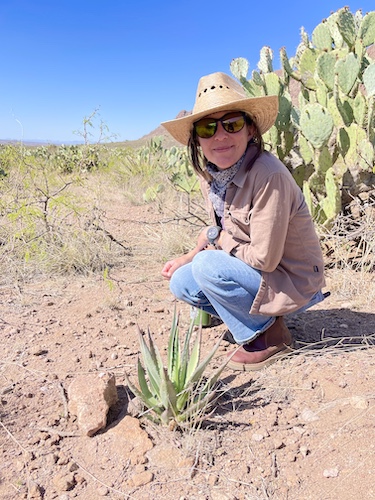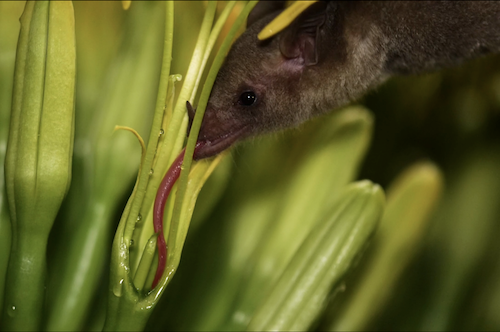 Rachel with newly planted agave.At noon January 29, 2025, Rachel Burke of Bat Conservation International (BCI) will present her work to help conserve nectar-feeding bats and restore their native habitats. This Lunch and Learn event of the Western Institute of Lifelong Learning (WILL) is part of free public programs by WILL and the Silver City Museum. The presentation will occur in the ABC room of the WNMU Global Resource Center, at 817 W. 12th Street in Silver City. You can also attend virtually through this link: https://wnmu.zoom.us/j/8818268280#success
Rachel with newly planted agave.At noon January 29, 2025, Rachel Burke of Bat Conservation International (BCI) will present her work to help conserve nectar-feeding bats and restore their native habitats. This Lunch and Learn event of the Western Institute of Lifelong Learning (WILL) is part of free public programs by WILL and the Silver City Museum. The presentation will occur in the ABC room of the WNMU Global Resource Center, at 817 W. 12th Street in Silver City. You can also attend virtually through this link: https://wnmu.zoom.us/j/8818268280#success
Rachel has been working with citizens in Grant County and other parts of the Southwest to collect bat DNA from their hummingbird feeders, and to plant agaves. The results will help scientists better understand the conditions that could aid recovery of nectar-feeding (nectivorous) bats.
Nectivorous bats and agaves have a mutualistic relationship. Pregnant bats need the sweet nectar of agave flowers to fuel their annual migration from central Mexico to the southwestern U.S., where they give birth and raise their pups. Agaves need the bats to disperse their pollen and propagate new plants. Agaves also have many uses to humans, and are important to both rural communities in Mexico and consumers in the U.S.
Rachel will show the interconnectedness of nectivorous bats, agaves, and people of two countries. She will also show how you can contribute to providing sustainable ecosystems that all depend upon.
 Bat feeding on agave flower; photo credit Horizon Line Photos/Bat Conservation International.For more than a decade, Rachel has worked in wildlife management, ecological monitoring, and habitat restoration across the Chihuahuan and Sonoran Deserts. She joined BCI in 2023, and now collaborates with diverse stakeholders to promote resilient landscapes for nectivorous bats. This builds on the thesis she completed at NMSU, which focused on management and habitat restoration for nectivorous bats.
Bat feeding on agave flower; photo credit Horizon Line Photos/Bat Conservation International.For more than a decade, Rachel has worked in wildlife management, ecological monitoring, and habitat restoration across the Chihuahuan and Sonoran Deserts. She joined BCI in 2023, and now collaborates with diverse stakeholders to promote resilient landscapes for nectivorous bats. This builds on the thesis she completed at NMSU, which focused on management and habitat restoration for nectivorous bats.










